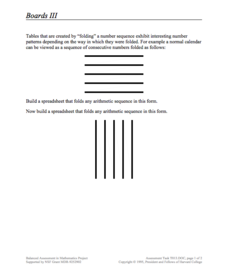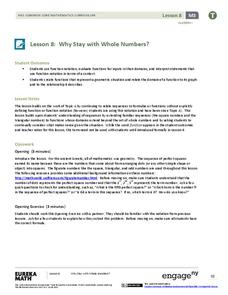Curated OER
Sequencing: Pictures Tell a Story
Students listen to a story and observe five illustrations of the main events drawn by the teacher. They arrange the illustrations in sequential order. Then, working in groups of five, they read stories and select five events, one for...
Curated OER
Countdown Challenge: Identifying Multiples
In this identifying multiples worksheet, students observe lists of numbers and identify certain multiples. In addition, they create their own multiple list and explore patterns in each multiple sequence. This one-page worksheet contains...
Curated OER
Missing Numbers
In this number sequence worksheet, students examine 6 number sequences and fill in 1 missing number in each sequence. Next, students use the strategy of counting by ten to complete 5 different number sequences.
Curated OER
2, 4, 6, 8 . . .What Do We Appreciate-Patterns, Patterns, Patterns
Students discover and predict patterns in a numerical sequence. Through the Internet and video segments, students begin with basic number patterns and extend their knowledge into higher math skills. They will also create new patterns...
Curated OER
2, 4, 6, 8 . . .What Do We Appreciate-Patterns, Patterns, Patterns
Students recognize patterns in a numerical sequence, create new patterns and predict outcomes to established sequences.
Curated OER
Patterns
Fifth graders investigate the use of patterns in a data set. The set is disolayed visually using cubes. This helps struggling students to see the quantity in order to make comparisons more effectively.
Alabama Learning Exchange
Musical Patterns
Young scholars explore the concept of patterning using musical instruments. In this music lesson, students identify several instruments and practice playing patterns with them. Young scholars identify the patterning in a musical piece.
Curated OER
Organizational Patterns
Eighth graders identify organizational patterns in their tests. Individually, they list five major organizational patterns and write a definition of each one. Students, in groups, assign responsibilities and complete assignment sheets...
Curated OER
Patterns: A Stitch in Time
Students recognize shapes, designs and numbers that form patterns. Using their surroundings, they identify common patterns. They create their own patterns in various software programs and share them with the class.
Concord Consortium
Boards III
Learn to visualize mathematical patterns as a folded pattern. Beginning with a visual display, the task encourages pupils to view sequences as a folded table. The pattern of the table then becomes a formula in a spreadsheet that...
American Museum of Natural History
DNA Detective
DNA is like the fingerprint of genetics. A quick lesson introduces the topic of DNA sequences with a mystery about an endangered species. The lesson shows how DNA extraction, replication, and sequencing often provide undeniable evidence...
University of Texas
Alphabetic Understanding, Phonics, and Spelling
Have your youngsters reading in no time with with collection of literacy activities and lessons. Starting with a basic understanding of the alphabet, this unit progressively builds students' phonemic awareness and ability to decode...
EngageNY
Why Stay with Whole Numbers?
Domain can be a tricky topic, especially when you relate it to context, but here is a lesson that provides concrete examples of discrete situations and those that are continuous. It also addresses where the input values should begin and...
Hood River County School District
Text Structure: Features and Organization
Teach learners how to interact with both fiction and non-fiction text with a packet of activities and worksheets. After looking over text structure and the difference in text features between different types of writing,...
Curated OER
Practice Book O
Whether you need resources for reading comprehension, literary analysis, phonics, vocabulary, or text features, an extensive packet of worksheets is sure to fit your needs. Based on a fifth-grade curriculum but applicable to any level of...
Curated OER
Algebra: Sequences and Patterns
In this patterns worksheet, students read the four steps to find the next three terms in a math sequence. Students find the pattern and write the next three terms in 13 problems.
Curated OER
An Introduction to Sequences
Fourth graders are introduced to arithmetic and geometric sequences. In this mathematics instructional activity, 4th graders produce a variety of sequences by varying the starting number, multiplier, and the add-on number.
Curated OER
Tricky Sequence
In this sequence worksheet, students solve 1 sequence problem. Students find the missing number in the sequence by finding the pattern of the sequence.
Curated OER
Extending Online Number Sequences
In this online number sequences worksheet, students work out the answers to eight comprehensive exercises with thirty-eight calculations involving a variety of sequences. Students answers are automatically graded online as they go and...
Curated OER
Geometric Sequences Puzzle
In this geometric sequences worksheet, students solve a geometric sequence puzzle. Students fill in the missing terms of various geometric sequences.
Curated OER
Family Letter - Order of Operations and Sequences
In this order of operations and sequences worksheet, students solve 16 short answer problems. Students create an arithmetic sequence by adding seven to a number. Students perform operations on numbers in various order to see the...
Curated OER
There's Gold in Them Thar Ratios
Students draw a model of the bunny problem which generates the Fibonacci Sequence, spirals generated from golden rectangles and golden triangles; identify the golden ratio in the human body, and find the Fibonacci numbers in nature.
Curated OER
Honors Algebra 2 Reivew: Practice with Sequences
In this practice with sequences worksheet, students find the arithmetic sequence and geometric sequence of given problems. They determine the percent of change and solve exponent problems. This one-page worksheet contains 11...
Curated OER
Finding the next Numbers in a Sequence
In this sequence activity, students identify the next three numbers in a given sequence. The solution to the problem is provided.























